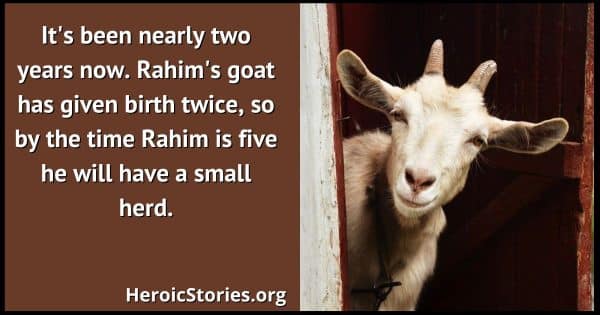by Christina Jordan
Kampala, Uganda

I first met Zarina during a walk on a Sunday afternoon shortly after my family arrived in Kampala, Uganda. We were beginning what would be a five-year stay in this country, and my husband and I were discussing hiring someone to help with the household and the children. As if sent by fate, a woman crossed the street to greet us and boldly asked if we needed help. She was recently widowed and looking for a new direction in life.
Something drew me to Zarina above all the other women we interviewed during the next two weeks, and we chose her. She had an irresistible air of spunk and courage and an absolute sense of right and wrong, which I admired. Over 18 months, she became like a sister to me and taught me a lot about Ugandan culture. There is one story in particular about Zarina which makes me proud to call her my friend.
Rahim, Zarina’s youngest child, was just two weeks old when his daddy died suddenly. He had only felt his father’s arms around him once — on a hospital bed. According to her Muslim custom, Zarina shaved her head and went into mourning. She left her two older children in Kampala and took Rahim with her to mourn in her husband’s village. She stayed indoors for four long months, nursing her infant and her sorrow, only seeing the light of day when she had to go to the latrine. When she emerged at the end of this ritual, she received a small amount of money from her husband’s relatives.
Zarina had nothing and no idea how she and her children would survive. She had few skills, no job experience to speak of, and no education beyond age 14. All she had to rely on was her big heart, her absolute faith, and her sharp wit. She truly needed that money, but for her there was no question of using it to make her own struggle easier. The money belonged to baby Rahim.
Zarina used that money to buy Rahim a goat — a small investment in her baby’s future in the name of his father. It was an act of love and courageous faith on Zarina’s part. She left the goat in the hands of a trusted relative and returned to Kampala to face an extremely uncertain future.
It’s been nearly two years now. Rahim’s goat has given birth twice, so by the time Rahim is five he will have a small herd. I hope that someday, Rahim will understand all that those goats stand for: hope, courage, and his mother’s devotion. For me, those goats symbolize everything that I respect about my friend Zarina, especially her unshakable determination to move forward in the face of adversity.
—
The author is the founder of the Life in Africa Foundation.
Available in The Best of HeroicStories, Volume 1.
Podcast: Play in new window | Download (Duration: 4:19 — 3.2MB)


This was so uplifting for me! Last Christmas, I looked over my 5 teenage grandchildren for a view of what to buy them as gifts. They had/have so much. They like expensive brands and fancy clothes and jewellry. I cannot afford to keep up and didn’t want to. Instead, I bought each family a goat for a family in an impoverished country.. I sent the kids the picture and a story. I was really worried that they would not like this but to their credit, every one was absolutely thrilled! I will do the same this year, against my adult kids’ wishes. The grandkids see the good.
They call it “third world” but they do know investment better than we do. All I leave my kids is money and a house full of stuff they will argue over or sell. Rahim will have means of earning a living.
Very moving story. Sorry. This one is real. Third world citizens know how to face life in a crisis and thrive.